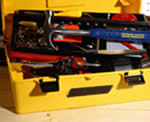 Go to main content
Go to main content
Archive Website of the UK government
Please note that this website has a UK government accesskeys system.
Main menu
Page menu
Money, tax and benefits

Tax relief for specialist tools or clothing

You may be able to get tax relief if you - and not your employer - spend money on any tools or specialist clothing you need to be able to do your job. You can go back several years to get the relief - the time you've got depends on whether you've previously sent in a Self Assessment tax return.
When you can get tax relief for tools and specialist clothing
As a general rule an employee can't get tax relief for the cost of clothing they wear to work - but there are some exceptions. For example, if you work in a sector like the building trade or the metal working industry you'll have to wear protective clothing like:
- overalls
- gloves
- boots
- helmets
If you must pay for the cost of repairing, cleaning or replacing this type of specialist clothing yourself and your employer doesn't reimburse you, then you are entitled to tax relief. However, you cannot claim for the initial cost of buying this clothing.
You are also entitled to tax relief if you have to buy - out of your own money - the tools you need to be able to do your work. For example, if you're a hairdresser your employer might require you to provide your own scissors.
The tax relief also applies to the cost of maintaining and replacing the tools.
What about uniforms
You can get tax relief on the cost of repairing, cleaning or replacing a uniform if:
- it's a recognisable uniform that shows you've got a certain sort of job - like a nurse or police uniform
- your employer requires you to wear it while you're working
- you've got to pay for it yourself
The tax relief also covers the cost of cleaning, repairing or replacing the uniform. You might also be entitled to tax relief for the cost of cleaning a uniform that your employer provides if you've got to pay for this yourself.
Flat Rate Expenses
If you have to spend money on tools or specialist clothing for your job you may be entitled to either:
- tax relief for the actual amounts you spend
- a flat rate deduction
Flat rate deductions are amounts that HM Revenue & Customs agreed nationally - or sometimes locally if conditions are very different - with trade unions or other bodies.
The deductions cover what's typically spent each year by employees in different trades. For example, someone working in the clothing industry can get a deduction of £60 each year. A cabinet maker can get a deduction for £140 while the deduction for a stone mason is £120.
You don't have to be a member of a trade union to get the deduction. You'll also benefit from less paperwork - you won't have to keep a record of all the individual amounts you spend. Follow the link below to see a table of agreed flat rate expense deductions.
Example: To work out the value of the deduction you will need to know the rate of tax you pay. You will get tax relief on the flat rate expense at the highest rate of tax you pay - this means if you pay tax at basic rate (20 per cent), higher rate (40 per cent) or additional rate (50 per cent).
If you’re a cabinet maker and pay basic rate tax, you can expect the following reduction in your tax bill:
£28 (£140 x 20%)
If your industry is not listed on the table, you can still claim a standard amount of £60 for the laundry costs of uniforms or protective clothing.
How to get tax relief for tools and specialist clothing
To find out how you can get tax relief for tools or specialist clothing and the time limits for getting it, read the guide 'How to get allowances and reliefs - employees or directors' - follow the link below.
Before you contact HMRC you’ll need to have all the following information to hand:
- name and address of your employer
- what expenses you are claiming for, for example the costs of laundering your uniform
- the industry you work in
- your occupation or job title
- details of any laundry or cleaning services provided by your employer
- details of payment or vouchers provided by your employer to cover laundry or other costs
 Facebook
Facebook Twitter
Twitter StumbleUpon
StumbleUpon Delicious
Delicious Reddit
Reddit
